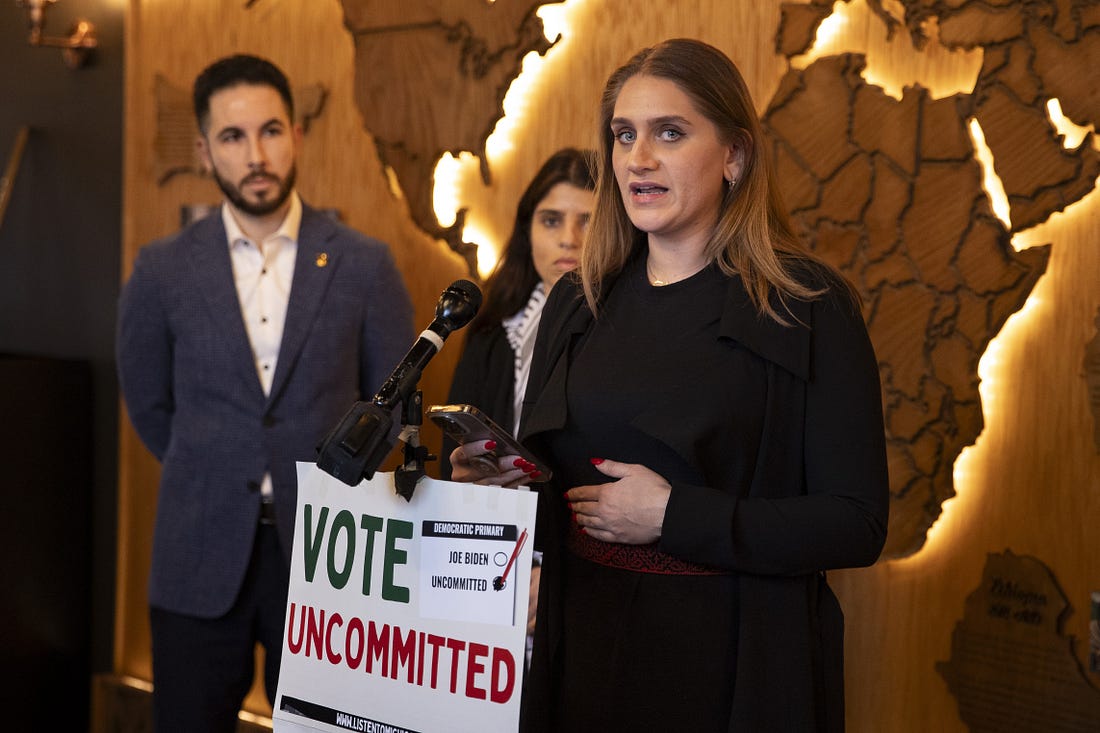|
 |
Hi, y’all. Welcome back to The Opposition. In my last year covering the Biden administration, it was hard to go anywhere with the president without confronting pro-Palestine protesters chanting “Genocide Joe.” I remember sitting in an auditorium in early January 2024 for what was supposed to be a tentpole speech on abortion rights, only for Biden to get interrupted fourteen times by shouts from the audience. It was a tense and uncomfortable speech, and his message on abortion rights was completely overshadowed.
Those protests continued throughout the election year, with groups like Uncommitted and Abandon Harris rallying opposition to the Democratic ticket. Now that we’re a few months into the Trump presidency, I wanted to check in with some of those activists to see if they had any regrets about their 2024 strategy. As always, I’d love to hear from you—please consider a Bulwark+ subscription so you can participate in the comments below.
–Lauren
Pro-Palestinian Activists Gave Trump a Boost. They Have No Regrets.
Groups that rallied against Biden and Harris say they’d do it all over again.
 |
They can’t stand Trump. But they fought against Biden and Harris over Gaza.
SINCE RETURNING TO OFFICE, Donald Trump has said he wants to “clean out” the Gaza Strip, send Palestinians to Egypt or Jordan, and construct a Mar-a-Gaza on the Mediterranean. He’s lifted Biden-era restraints on Israel, including a hold on the supply of 2,000-pound bombs. And while he has secured the releases of hostages, he has not brought an end to the war, despite promising to do so.
In fact, the humanitarian situation in Gaza has grown only more dire on his watch. Israel has expanded its attacks and aid to Palestinian civilians has been blocked for nearly two months. Food that was stockpiled during the ceasefire at the start of the year is running out, with international health officials warning of worsening malnutrition among children.
The record, in the aggregate, has been one of more conflict and suffering. And it raises the obvious question of whether pro-Palestine voters and groups who called for opposing or abstained from supporting Joe Biden and Kamala Harris over their handling of the war feel even a tinge of regret.
For the most part, the answer is a clear “no.”
“It was worth it because we got to continue centering what was happening in Gaza,” said Layla Elabed, the cofounder of Uncommitted, which declined to endorse Harris and encouraged people to vote their conscience. Asked if she feels any guilt about Trump’s win, Elabed said that what frustrates her is that their months of activism ultimately “wasn’t enough to save lives.”
“We spent a year as Democrats warning [the party] that our communities like Dearborn were grieving and attending funeral after funeral,” Elabed continued. “Our party leaders offered spin instead of change.”
As Democrats across the spectrum diagnose what went wrong in 2024, the pro-Palestine activists that had traditionally resided within the party’s ideological ranks don’t seem particularly interested in reassessing the choices they made. Activists like Elabed argue that it’s easier for the party to point fingers than to deal with the thornier questions of U.S. policy toward Israel.
It’s hard to determine just how much of an impact efforts like Uncommitted or Abandon Harris had in the election results. After all, exit polls showed that voters were motivated more by the economy than by foreign policy. But in battleground states with large Arab-American populations, like Michigan, data suggests that the Israel-Hamas conflict turned people away from Harris. In Dearborn, the country’s largest Arab-majority city, election data showed that Trump won 42 percent of the vote while Harris received 36 percent—significantly less than the 69 percent that Biden earned in 2020.
But the activists note that it wasn’t just Dearborn and other Muslim-American enclaves that moved toward Republicans in 2024—nearly every district in the country moved to the right as well.
“We have zero regrets about everything we did throughout 2024. I want that noted, underlined, bolded, as clear as possible,” said Hudhayfah Ahmad, a spokesperson for the Abandon Harris movement. “Our loyalty is to our morals, our principles, our values.”
Not everyone has been won over by this worldview. Indeed, elsewhere in the party, frustration has been on a slow simmer over the absence of contrition or introspection from the pro-Palestinian groups. For them, the idea that those activists could look at the current situation in Gaza and feel vindicated about their election-season decisions doesn’t just defy logic—it lacks morality.
“People are just trying to justify their bad choices. I don’t think it’s a defensible position to say that there’s no difference. It’s absurd to think that Harris would not be approaching this issue differently than Trump. We’re talking about, you know, paving Gaza. It’s just not a credible position to say there’s no difference,” said Adam Jentleson, former chief of staff to Pennsylvania Sen. John Fetterman. “Activists need to think harder about what outcome they’re trying to produce.”
THAT THE FISSURE over the Israel-Hamas war has not been resolved 100-plus days into Trump’s presidency should not come as a surprise. It may be the most fraught geopolitical issue of our time—and, beyond that, we’re talking about a faction of people (Democrats) preternaturally prone to emotional disagreements.
But it does foreshadow potential problems for the party in the midterm elections, particularly in states with competitive primaries. Activists with Abandon Harris, which urged supporters to back Jill Stein in 2024, told The Bulwark that they are restructuring their organization and will relaunch in a few weeks under a new name. They plan to be particularly active in Senate primaries, including the Michigan race to replace retiring Sen. Gary Peters. Abdul El-Sayed—a former public health official who was an early supporter of the Uncommitted movement but still supported Harris in the general election—recently entered the crowded primary.
Ahead of the election for chair of the Democratic National Committee earlier